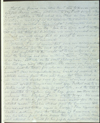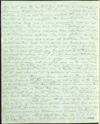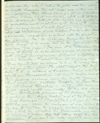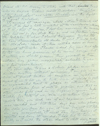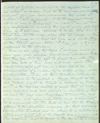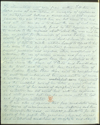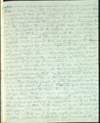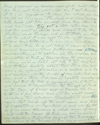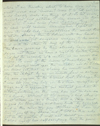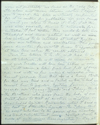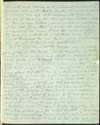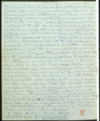Mahatma Letter No. 20: Difference between revisions
No edit summary |
Pablo Sender (talk | contribs) |
||
| (52 intermediate revisions by 7 users not shown) | |||
| Line 1: | Line 1: | ||
{{Infobox MLbox | {{Infobox MLbox | ||
| header1 = People involved | | | header1 = People involved | | ||
| Line 11: | Line 7: | ||
| writtendate = unknown | | writtendate = unknown | ||
| receiveddate = August 5, 1881 | | receiveddate = August 5, 1881 | ||
| otherdate = | | otherdate = unknown | ||
| header3 = Places | | header3 = Places | ||
| sentfrom = unknown | | sentfrom = unknown | ||
| receivedat = [[Umballa, India]] | | receivedat = [[Umballa, India]] | ||
| vialocation = | | vialocation = unknown{{pad|9em}} | ||
}} | }} | ||
''' | This is '''Letter No. 20''' in '''[[The Mahatma Letters to A. P. Sinnett (book)|''The Mahatma Letters to A. P. Sinnett'']], 4th chronological edition'''. It corresponds to '''Letter No. 49''' in '''Barker numbering.''' See below for [[Mahatma Letter No. 20#Context and background|Context and background]]. | ||
<br> | <br> | ||
<br> | <br> | ||
| Line 47: | Line 43: | ||
{{Col-begin|width=98%}} | {{Col-begin|width=98%}} | ||
{{Col-break|width=55%}} | {{Col-break|width=55%}} | ||
Just home. Received more letters than I care to answer — yours excepted. Having nothing particular to say, I will simply attend to your questions; a task which may seem an easy one, but is not so, in reality, if we but remember that similar in that to the deity described in [[Upanishad]] as " | Just home. Received more letters than I care to answer — yours excepted. Having nothing particular to say, I will simply attend to your questions; a task which may seem an easy one, but is not so, in reality, if we but remember that similar in that to the deity described in <u>[[Upanishads (book)|Upanishad]]</u> as "Sokāmayata bahuh syām prajāye yeti"—they "love to be many and to multiply." At any rate, thirst for knowledge was never regarded as a sin and you will always find me prompt to answer such queries—that can be answered. | ||
Certainly I am of opinion that since our correspondence was established for the good of the many it would prove very little profitable to the world at large unless you do recast the teachings and ideas contained therein "in the form of an essay," not only on the [[occult]] philosophical view of creation but upon every other question. The sooner you begin your "future book" the better; for who can answer for unexpected incidents? Our correspondence may break off suddenly the obstacle coming from those who know best. | Certainly I am of opinion that since our correspondence was established for the good of the many it would prove very little profitable to the world at large unless you do recast the teachings and ideas contained therein "in the form of an essay," not only on the [[occult]] philosophical view of creation but upon every other question. The sooner you begin your "future book" the better; for who can answer for unexpected incidents? Our correspondence may break off suddenly the obstacle coming from those who <u>know best</u>. <u><span style="border-bottom: 1px double #000;">Their mind</span></u>—as you know, is a sealed book for many of us, and which no amount of "art magic" can break open. Further "aids to reflection" will however come in good time; and the little I am permitted to explain, may, I hope, prove more comprehensive than [[Eliphas Levi]]'s <u>Haute Magie</u>. No wonder you find it cloudy, for it was never meant for the uninitiated reader. [[Eliphas Levi|Eliphas]] studied from the [[Rosicrucianism|Rosicrucian]] MSS. (now reduced to three copies in Europe). These expound our eastern doctrines from the teachings of [[Christian Rosenkreuz|Rosencranz]], who, upon his return from Asia dressed them up in a semi-[[Christianity|Christian]] garb intended as a shield for his pupils, against clerical revenge. | ||
{{Col-break|width=3%}} | {{Col-break|width=3%}} | ||
| Line 57: | Line 53: | ||
{{Col-break|width=30%}} | {{Col-break|width=30%}} | ||
'''NOTES:''' | '''NOTES:''' | ||
* | * '''"The deity described in Upanishad"''' refers to [[Brahman]]'s statement in the ''Taittirīya Upaniṣad'' (2.6.1): ''so 'kāmayata bahu syām prajāyeyeti'', which can be translated as, "He desired—Let me become many, let me be born." | ||
* '''Haute Magie''' refers to [[Eliphas Levi]]'s book ''The Doctrine and Ritual of High Magic''. | |||
{{Col-end}} | {{Col-end}} | ||
| Line 65: | Line 61: | ||
{{Col-begin|width=98%}} | {{Col-begin|width=98%}} | ||
{{Col-break|width=55%}} | {{Col-break|width=55%}} | ||
One must have the key to it and that key is a science per se. [[Christian Rosenkreuz|Rosencranz]] taught orally. [[Saint Germain]] recorded the good doctrines in figures and his only cyphered MS. remained with his staunch friend and patron the benevolent German Prince from whose house and in whose presence he made his last | One must have the key to it and that key is a science per se. [[Christian Rosenkreuz|Rosencranz]] taught orally. [[Saint Germain]] recorded the good doctrines in figures and his only cyphered MS. remained with his staunch friend and patron the benevolent German Prince from whose house and in whose presence he made his last exit—<u><span style="border-bottom: 1px double #000;">Home</span></u>. Failure, dead failure! Speaking of "figures" and "numbers" [[Eliphas Levi|Eliphas]] addresses those who know something of the [[Pythagoras|Pythagorean]] doctrines. Yes; some of them do sum up all philosophy and include all doctrines. Isaac Newton understood them well; but withheld his knowledge very prudently for his own reputation, and very unfortunately for the writers of <u>Saturday Review</u> and its contemporaries. You seem to admire it — I do not. However talented from the literary point of view, a paper which gives vent to such unprogressive and dogmatic ideas as the one I came across in it, lately, ought to lose caste among its more liberal confreres. Scientific men, it thinks — "do not make at all good observers" at exhibitions of modern [[Magic|magic]], [[spiritism]] and other "nine days wonders." This is certainly not as it should be, it adds for, "<u>knowing as well as they do the limits of the natural</u> (?!!) they should begin by assuming that what they see, or what they think they see, <u>cannot be done</u>, and should next look for the fallacy" etc. etc. Circulation of the blood, electric telegraph, railway and steamer argument all over again. <u>They</u> <u>know</u> "the limits of the natural"!! Oh, century of conceit and mental obscuration! And we are invited to London, among these academical rags whose predecessors persecuted [[Mesmer]] and branded <u>[[St. Germain]]</u> as an impostor! All is <u>secret</u> for <u>them</u> as yet in nature of <u>man</u>—they know but the skeleton and form; | ||
{{Col-break|width=3%}} | {{Col-break|width=3%}} | ||
| Line 73: | Line 69: | ||
{{Col-break|width=30%}} | {{Col-break|width=30%}} | ||
'''NOTES:''' | '''NOTES:''' | ||
* ''The Saturday Review of Politics, Literature, Science, and Art'' was a London weekly newspaper established by A. J. B. Beresford Hope in 1855. | * '''Saturday Review''' was ''The Saturday Review of Politics, Literature, Science, and Art'' was a London weekly newspaper established by A. J. B. Beresford Hope in 1855. | ||
* "His only cyphered MS." The French Library at Troyes has a ciphered MS. (No. 2400) attributed to [[Saint Germain]], entitled "La Tres Sainte Trinosophie" (''The Most Holy Trinosophia''). Some attribute this MS. to [[Cagliostro]] | * '''"His only cyphered MS."''' The French Library at Troyes has a ciphered MS. (No. 2400) attributed to [[Saint Germain]], entitled "La Tres Sainte Trinosophie" (''The Most Holy Trinosophia''). Some attribute this MS. to [[Cagliostro]]. | ||
{{Col-end}} | {{Col-end}} | ||
| Line 82: | Line 77: | ||
{{Col-begin|width=98%}} | {{Col-begin|width=98%}} | ||
{{Col-break|width=55%}} | {{Col-break|width=55%}} | ||
hardly are they able to outline the paths through which the invisible messengers they call "senses" pass on their way to man's perceptions; their school science is a hot-bed of doubts and conjectures; it teaches but | hardly are they able to outline the paths through which the invisible messengers they call "senses" pass on their way to man's perceptions; their school science is a hot-bed of doubts and conjectures; it teaches but its own sophistry, infects with its emasculation, its scorn for truth, its false morality and dogmatism, and its representatives would boast knowing <u>"the limits of the natural."</u> <u><span style="border-bottom: 1px double #000;">Bus</span></u>—my good friend; I would forget you belonged to this generation, and are an admirer of your "modern Science." Her behests and oracular verdicts are on a level with the papal—<u>non possumus</u>. Yes; the <u>Saturday Review</u> has let us off easily enough to be sure. Not so the <u>[[Spiritualism|Spiritualist]]</u>. Poor perplexed, wee paper! You gave it a tremendous blow. Losing its footing on [[Mediumship|mediumistic]] ground, it fights its death struggle for supremacy of English [[adept]]ship over Eastern knowledge. I almost hear its sub rosa cry: "If we [[Spiritualism|Spiritualists]] are shown to be in the wrong box so are you — [[theosophist]]s." The great "[[Adept]]," the formidable J.K. is certainly a dangerous enemy; and I am afraid, our [[Bodhisattva|Boddhisatwas]] will have to confess some day their profound ignorance before his mighty learning. "Real [[Adept]]s like [[Gautama Buddha]] or [[Jesus Christ]] did not shroud themselves in mystery, but came and taught openly," quoth our [[oracle]]. If they did it's news to us — the humble followers of the former. [[Gautama Buddha|Gautama]] is qualified the "Divine Teacher" and at the same time "<u><span style="border-bottom: 1px double #000;">God</span></u>'s messenger"!! (See Spt., July 8th, p. 21. para 2.) [[Buddha]] has now become the messenger of one, whom He, Sankia K'houtchoo, the precious [[wisdom]], has dethroned 2,500 years back, by unveiling the Tabernacle and showing its emptiness. Where did that cockney [[adept]] learn his [[Buddhism]], I wonder? You really ought to advise your | ||
{{Col-break|width=3%}} | {{Col-break|width=3%}} | ||
| Line 90: | Line 85: | ||
{{Col-break|width=30%}} | {{Col-break|width=30%}} | ||
'''NOTES:''' | '''NOTES:''' | ||
* | * '''Bus''' or '''Buss''' is an expression used by the [[Master]] that means "enough (for now)". | ||
* "The Saturday Review | * '''Non possumus''' is a Latin expression meaning literally "We cannot" (or "will not"). This was the name given to the diplomatic policy of several popes in their relations with foreign powers. | ||
* '''The Saturday Review'''. See note above. | |||
* '''Sub rosa''' is a Latin phrase used in English to denote secrecy or confidentiality. | |||
* '''J.K.''' refers to Julius Kohn, known as a "Jewish Kabalist." He wrote the article "Information for Theosophists, from an Adept" in the [http://www.iapsop.com/archive/materials/spiritualist/spiritualist_v19_n2_jul_8_1881.pdf# ''Spiritualist'', July 8th, pp. 20-22], where he arrogantly attacked the [[Masters of Wisdom|Masters]] and the [[Theosophical Society]]. | |||
{{Col-end}} | {{Col-end}} | ||
| Line 111: | Line 109: | ||
{{Col-break|width=30%}} | {{Col-break|width=30%}} | ||
'''NOTES:''' | '''NOTES:''' | ||
* "The Lotus of the Good Law" or "Lotus Sutra" (Saddharmapuṇḍarīka sūtra) is one of the earlier [[Mahāyāna Buddhism|Mahāyāna Buddhist]] texts venerated as the quintessence of truth by the Japanese Tendai and Nichiren sects. | * '''"The Lotus of the Good Law"''' or "Lotus Sutra" (Saddharmapuṇḍarīka sūtra) is one of the earlier [[Mahāyāna Buddhism|Mahāyāna Buddhist]] texts venerated as the quintessence of truth by the Japanese Tendai and Nichiren sects. | ||
* "Atma Boddha" is probably referring to the work written by [[Śankarāchārya]]. | * '''"Atma Boddha"''' is probably referring to the work written by [[Śankarāchārya]]. | ||
{{Col-end}} | {{Col-end}} | ||
| Line 129: | Line 127: | ||
{{Col-break|width=30%}} | {{Col-break|width=30%}} | ||
'''NOTES:''' | '''NOTES:''' | ||
* | * '''Plaidoyer''' is a French expression meaning a defense of a position, such as a plea or argument in court. | ||
* '''Finis''' is Latin for "the end." | |||
{{Col-end}} | {{Col-end}} | ||
| Line 136: | Line 135: | ||
{{Col-begin|width=98%}} | {{Col-begin|width=98%}} | ||
{{Col-break|width=55%}} | {{Col-break|width=55%}} | ||
The illumination must come from within. Till then no hocus pocus of incantations, or mummery of appliances, no metaphysical lectures or discussions, no self-imposed penance can give it. All these are but means to an end, and all we can do is to direct the use of such means as have been empirically found by the experience of ages to conduce to the required object. And this was and has been no secret for thousands of years. Fasting, [[meditation]], chastity of thought, word, and deed; silence for certain periods of time to enable nature herself to speak to him who comes to her for information; government of the animal passions and impulses; utter unselfishness of intention, the use of certain incense and fumigations for physiological purposes, have been published as the means since the days of [[Plato]] and [[Iamblichus]] in the West, and since the far earlier times of our Indian [[Rishi]]s. How these must be complied with to suit each individual temperament is of course a matter for his own experiment and the watchful care of his tutor or [[ | The illumination must come from within. Till then no hocus pocus of incantations, or mummery of appliances, no metaphysical lectures or discussions, no self-imposed penance can give it. All these are but means to an end, and all we can do is to direct the use of such means as have been empirically found by the experience of ages to conduce to the required object. And this was and has been no secret for thousands of years. Fasting, [[meditation]], chastity of thought, word, and deed; silence for certain periods of time to enable nature herself to speak to him who comes to her for information; government of the animal passions and impulses; utter unselfishness of intention, the use of certain incense and fumigations for physiological purposes, have been published as the means since the days of [[Plato]] and [[Iamblichus]] in the West, and since the far earlier times of our Indian [[Rishi]]s. How these must be complied with to suit each individual temperament is of course a matter for his own experiment and the watchful care of his tutor or [[guru]]. Such is in fact part of his course of discipline, and his [[guru]] or [[Initiation|initiator]] can but assist him with his experience and will power but can do no more until the last and Supreme [[initiation]]. I am also of opinion that few candidates imagine the degree of inconvenience — nay suffering and harm to himself — the said [[Initiation|initiator]] submits to for the sake of his pupil. The peculiar physical, moral, and intellectual conditions of [[neophyte]]s and [[Adept]]s | ||
{{Col-break|width=3%}} | {{Col-break|width=3%}} | ||
| Line 152: | Line 151: | ||
{{Col-begin|width=98%}} | {{Col-begin|width=98%}} | ||
{{Col-break|width=55%}} | {{Col-break|width=55%}} | ||
alike vary much, as anyone will easily understand; thus, in each case, the instructor has to adapt his conditions to those of the pupil, and the strain is terrible for to achieve success we have to bring ourselves into a full rapport with the subject under training. And as, the greater the powers of the [[Adept]] the less he is in sympathy with the natures of the | alike vary much, as anyone will easily understand; thus, in each case, the instructor has to adapt his conditions to those of the pupil, and the strain is terrible for to achieve success we have to bring ourselves into a full rapport with the subject under training. And as, the greater the powers of the [[Adept]] the less he is in sympathy with the natures of the profanes who often come to him saturated with the emanations of the outside world, those animal emanations of the selfish, brutal, crowd that we so dread — the longer he was separated from that world and the purer he has himself become, the more difficult the self-imposed task. Then — knowledge, can only be communicated gradually; and some of the highest secrets — if actually formulated even in your well prepared ear — might sound to you as insane gibberish, notwithstanding all the sincerity of your present assurance that "absolute trust defies misunderstanding." This is the real cause of our reticence. This is why people so often complain with a plausible show of reason that no new knowledge is communicated to them, though they have toiled for it for two, three or more years. Let those who really desire to learn abandon all and come to us, instead of asking or expecting us to go to them. But how is this to be done in your world, and atmosphere? "Woke up sad on the morning of the 18th." Did you? Well, well, patience, my good brother, patience. Something has occurred, though you | ||
This is why people so often complain with a plausible show of reason that no new knowledge is communicated to them, though they have toiled for it for two, three or more years. Let those who really desire to learn abandon all and come to us, instead of asking or expecting us to go to them. But how is this to be done in your world, and atmosphere? "Woke up sad on the morning of the 18th." Did you? Well, well, patience, my good brother, patience. Something has occurred, though you | |||
{{Col-break|width=3%}} | {{Col-break|width=3%}} | ||
{{Col-break|width=15%}} | {{Col-break|width=15%}} | ||
| Line 161: | Line 158: | ||
{{Col-break|width=30%}} | {{Col-break|width=30%}} | ||
'''NOTES:''' | '''NOTES:''' | ||
* "The morning of the 18th." In [[ML18|letter No. 18]] the [[Mahatma]] wrote to [[A. P. Sinnett]]: "Remember then on the 17th of July and..." | * '''"The morning of the 18th."''' In [[ML18|letter No. 18]] the [[Mahatma]] wrote to [[A. P. Sinnett]]: "Remember then on the 17th of July and..." followed by six lines that have been deleted from the original. | ||
{{Col-end}} | {{Col-end}} | ||
| Line 169: | Line 166: | ||
{{Col-begin|width=98%}} | {{Col-begin|width=98%}} | ||
{{Col-break|width=55%}} | {{Col-break|width=55%}} | ||
have preserved no consciousness of the event | have preserved no consciousness of the event. But let this rest. Only what more can I do? How am I to give expression to ideas for which you have as yet no language? The finer and more susceptible heads get like yourself, more than others do, and even when they get a little extra dose it is lost for want of words and images to fix the floating ideas. Perhaps, and undoubtedly you know not to what I now refer to. You will know it one day — Patience. To give more knowledge to a man than he is yet fitted to receive is a dangerous experiment; and furthermore, other considerations go to restrain me. The sudden communication of facts, so transcending the ordinary, is in many instances fatal not only to the [[neophyte]] but to those directly about him. It is like delivering an infernal machine or a cocked and loaded revolver into the hands of one who had never seen such a thing. Our case is exactly analogous. We feel that the time is approaching, and that we are bound to choose between the triumph of Truth or the Reign of Error and — Terror. We have to let in a few chosen ones into the great Secret, or — allow the infamous [[Dugpa#Shammar|Shammars]] to lead Europe's best minds into the most insane and fatal of superstitions — [[Spiritualism]]; and we do feel as if we were delivering a whole cargo of dynamite into the hands of those, we are anxious to see defending themselves against the [[Dugpas|Red Capped]] [[Brothers of the Shadow]]. You are curious to know | ||
{{Col-break|width=3%}} | {{Col-break|width=3%}} | ||
| Line 177: | Line 174: | ||
{{Col-break|width=30%}} | {{Col-break|width=30%}} | ||
'''NOTES:''' | '''NOTES:''' | ||
* | * '''Infamous Shammars'''. The Tibetan word ''shamar'' (ཞྭ་དམར ''zhwa dmar'') means "red hat." Here it is a reference to Tibetan [[dugpa]]s. | ||
{{Col-end}} | {{Col-end}} | ||
| Line 185: | Line 182: | ||
{{Col-begin|width=98%}} | {{Col-begin|width=98%}} | ||
{{Col-break|width=55%}} | {{Col-break|width=55%}} | ||
where I am travelling about; to learn more of my great work and mission? Were I to tell you, you could hardly make anything of it. To test your knowledge and patience, I may answer you though — this once. I now come from Sakkya-Jong. To you the name will remain meaningless. Repeat it before the "[[H. P. Blavatsky|Old Lady]]" and — observe the result. But to return. Having then, to deliver with one hand the much needed yet dangerous weapon to the world, and with the other to keep off the [[ | where I am travelling about; to learn more of my great work and mission? Were I to tell you, you could hardly make anything of it. To test your knowledge and patience, I may answer you though — this once. I now come from Sakkya-Jong. To you the name will remain meaningless. Repeat it before the "[[H. P. Blavatsky|Old Lady]]" and — observe the result. But to return. Having then, to deliver with one hand the much needed yet dangerous weapon to the world, and with the other to keep off the [[Dugpa#Shammar|Shammars]] (the havoc produced by them already being immense) do you not think we have a right to hesitate, to pause and feel the necessity of caution, as we never did before? To sum up: the misuse of knowledge by the pupil always reacts upon the [[initiation|initiator]]; nor, do I believe you know yet, that in sharing his secrets with another, the [[Adept]] by an immutable Law, is delaying his own progress to the Eternal Rest. Perhaps, what I now tell you, may help you to a truer conception of things, and to appreciate our mutual position the better. Loitering on the way, does not conduce to a speedy arrival at the journey's end. And, it must strike you as a truism, that a Price must be paid for everything and every truth by somebody and in this case — we pay it. Fear not; I am willing to pay my share, and I told so those who put me the question. I will not desert you; nor will I show myself less self-sacrificing than the poor, | ||
{{Col-break|width=3%}} | {{Col-break|width=3%}} | ||
| Line 193: | Line 190: | ||
{{Col-break|width=30%}} | {{Col-break|width=30%}} | ||
'''NOTES:''' | '''NOTES:''' | ||
* | * '''Sakkya-Jong''' (also spelled Sakia-jong or Sakya-dzong). The [[Master]] may be referring to the chief monastery of the Sakyapa Order situated about 150 km southwest of Shigatse. | ||
{{Col-end}} | {{Col-end}} | ||
| Line 201: | Line 198: | ||
{{Col-begin|width=98%}} | {{Col-begin|width=98%}} | ||
{{Col-break|width=55%}} | {{Col-break|width=55%}} | ||
worn out mortality we know as the "[[H. P. Blavatsky|Old Lady]]." The above must remain between us two. I expect you to regard this letter as strictly confidential for it is neither for publication nor your friends. I want you alone to know it. Only, if all this was more generally known to candidates for [[initiation]], I feel certain they would be both more thankful and more patient as well as less inclined to be irritated at what they consider our reticence and vacillations. Few possess your discretion; fewer still know to appreciate at their true value the results obtained. . . . Your two letters to [[Stainton Moses|S.M.]] will lead to no result whatever. He will remain as immovable and your trouble will have been taken in vain. You will receive a letter from him full of suspicion and with no few unkind remarks. You cannot persuade him that [[Imperator|+]] is a living [[Brother]] for that was tried and — failed; unless, indeed, you convert him to popular exoteric [[Tibetan Buddhism|Lamaism]]; which regards our "Byang-tzyoobs" and "Tchang-chubs" — the [[Brothers]] who pass from the body of one great Lama to that of another — as | worn out mortality we know as the "[[H. P. Blavatsky|Old Lady]]." The above must remain between us two. I expect you to regard this letter as strictly confidential for it is neither for publication nor your friends. I want you alone to know it. Only, if all this was more generally known to candidates for [[initiation]], I feel certain they would be both more thankful and more patient as well as less inclined to be irritated at what they consider our reticence and vacillations. Few possess your discretion; fewer still know to appreciate at their true value the results obtained. . . . | ||
Your two letters to [[Stainton Moses|S.M.]] will lead to no result whatever. He will remain as immovable and your trouble will have been taken in vain. You will receive a letter from him full of suspicion and with no few unkind remarks. You cannot persuade him that [[Imperator|+]] is a living [[Brother]] for that was tried and — failed; unless, indeed, you convert him to popular exoteric [[Tibetan Buddhism|Lamaism]]; which regards our "Byang-tzyoobs" and "Tchang-chubs" — the [[Brothers]] who pass from the body of one great Lama to that of another — as [[Lha]]s or disembodied Spirits. Remember what I said in my last of [[Planetary Spirits]]. The Tchang-chub (an [[adept]] who has, by the power of his knowledge and soul enlightenment, become exempt from the curse Of UNCONSCIOUS transmigration) — may, at | |||
{{Col-break|width=3%}} | {{Col-break|width=3%}} | ||
| Line 209: | Line 208: | ||
{{Col-break|width=30%}} | {{Col-break|width=30%}} | ||
'''NOTES:''' | '''NOTES:''' | ||
* | * '''Byang-tzyoobs''' and '''Tchang-chubs'''. Usually spelled ''changchub'' (Tib. ''byang chub'') the term is a translation of the [[Sanskrit]] word ''bodhi'', meaning enlightenment or awakening. In Tibetan, ''Chang'' (byang) means purified and ''chub'' means replete. | ||
{{Col-end}} | {{Col-end}} | ||
| Line 218: | Line 217: | ||
his will and desire, and instead of [[reincarnation|reincarnating]] himself only after bodily death, do so, and repeatedly — during his life if he chooses. He holds the power of choosing for himself new bodies — whether on this or any other planet — while in possession of his old form, that he generally preserves for purposes of his own. Read the book of Khiu-tee and you will find in it these laws. She might translate for you some paras, as she knows them by rote. To her you may read the present. | his will and desire, and instead of [[reincarnation|reincarnating]] himself only after bodily death, do so, and repeatedly — during his life if he chooses. He holds the power of choosing for himself new bodies — whether on this or any other planet — while in possession of his old form, that he generally preserves for purposes of his own. Read the book of Khiu-tee and you will find in it these laws. She might translate for you some paras, as she knows them by rote. To her you may read the present. | ||
Do I often laugh at "the helpless way in which you grope in the dark?" Most decidedly not. That would be as unkind and about as foolish for me to do as for you to laugh at a [[Hinduism|Hindu]] for his pidgin English, in a district, where your Government will not teach people English. Whence such a thought? And whence that other to have my [[Portraits of the Masters|portrait]]? Never had but one taken, in my whole life; a poor ferrotype produced in the days of the "Gaudeamus" by a travelling female artist — (some relative, I suppose, of the Munich | Do I often laugh at "the helpless way in which you grope in the dark?" Most decidedly not. That would be as unkind and about as foolish for me to do as for you to laugh at a [[Hinduism|Hindu]] for his pidgin English, in a district, where your Government will not teach people English. Whence such a thought? And whence that other to have my [[Portraits of the Masters|portrait]]? Never had but one taken, in my whole life; a poor ferrotype produced in the days of the "Gaudeamus" by a travelling female artist — (some relative, I suppose, of the Munich Beer-Hall beauties that you have interviewed of late) — and from whose hands I had to rescue it. The ferrotype is there, but the image itself has vanished: the nose peeled off and one of the eyes gone. No other to offer. I dare not promise for I never break my word. Yet — I may try — some day to get you one. | ||
Quotation from [[Alfred, Lord Tennyson|Tennyson]]? Really cannot say. Some stray lines picked up in the [[astral light]] or in somebody's brain and remembered, I never forget what I once see or read. A bad habit. So much so, that often and | Quotation from [[Alfred, Lord Tennyson|Tennyson]]? Really cannot say. Some stray lines picked up in the [[astral light]] or in somebody's brain and remembered, I never forget what I once see or read. A bad habit. So much so, that often and unconsciously | ||
{{Col-break|width=3%}} | {{Col-break|width=3%}} | ||
| Line 228: | Line 227: | ||
{{Col-break|width=30%}} | {{Col-break|width=30%}} | ||
'''NOTES:''' | '''NOTES:''' | ||
* | * '''Khiu-tee''': according to [[David Reigle]], the [[Kiu-Te]] (Tib. rGyud-sde) is a section of the "Kangyur" (Tib. bKa'-'gyur), a collection of Tibetan Buddhist sacred literature divided into two kinds, "mDo-sde" (sutras) and "rGyud-sde" (tantras). | ||
* | * '''ferrotype''' is a tintype, or a positive photograph made by a collodion process on a thin iron plate having a darkened surface. | ||
* '''"Gaudeamus"''' probably refer to "Gaudeamus Igitur" ("So Let Us Rejoice"), a popular academic song in many Western countries, mainly used at university graduation ceremonies. The current Latin lyrics were published in 1781. | |||
{{Col-end}} | {{Col-end}} | ||
| Line 251: | Line 250: | ||
{{Col-break|width=30%}} | {{Col-break|width=30%}} | ||
'''NOTES:''' | '''NOTES:''' | ||
* The Ghalaring-Tcho Lamasery is probably located at Nganglaring Tso, Ngari, Xizang (Tibet). | * The '''Ghalaring-Tcho Lamasery''' is probably located at Nganglaring Tso, Ngari, in the western part of Xizang (Tibet), close to a large lake called Ngangla Ringco. | ||
{{Col-end}} | {{Col-end}} | ||
| Line 257: | Line 256: | ||
== Context and background == | == Context and background == | ||
[[A. P. Sinnett]] was on his way to [[Simla, India|Simla]] to join [[H. P. Blavatsky]] and [[A. O. Hume]], where they would discuss the formation of the [[Simla Eclectic Theosophical Society]]. | |||
== Physical description of letter == | == Physical description of letter == | ||
| Line 266: | Line 266: | ||
== Publication history == | == Publication history == | ||
== Commentary about this letter == | == Commentary about this letter == | ||
== Notes == | == Notes == | ||
<references/> | <references/> | ||
[[Category:ML from Koot Hoomi]] | |||
[[Category:ML to A. P. Sinnett]] | |||
[[Category:ML with images]] | |||
[[Category:ML needs commentary]] | |||
[[es:Carta de los Mahatmas No. 20]] | |||
[[it:Lettera dei Mahatma n° 49]] | |||
Latest revision as of 21:45, 14 June 2021
| Quick Facts | |
|---|---|
| People involved | |
| Written by: | Koot Hoomi |
| Received by: | A. P. Sinnett |
| Sent via: | unknown |
| Dates | |
| Written on: | unknown |
| Received on: | August 5, 1881 |
| Other dates: | unknown |
| Places | |
| Sent from: | unknown |
| Received at: | Umballa, India |
| Via: | unknown |
This is Letter No. 20 in The Mahatma Letters to A. P. Sinnett, 4th chronological edition. It corresponds to Letter No. 49 in Barker numbering. See below for Context and background.
< Prev letter chrono
Next letter chrono >
< Prev letter Barker
Next letter Barker >
Cover sheet
|
Letter from K.H., received at Umballa on the way to Simla about August 5, 1881. |
NOTES: |
Page 1 transcription, image, and notes
|
Just home. Received more letters than I care to answer — yours excepted. Having nothing particular to say, I will simply attend to your questions; a task which may seem an easy one, but is not so, in reality, if we but remember that similar in that to the deity described in Upanishad as "Sokāmayata bahuh syām prajāye yeti"—they "love to be many and to multiply." At any rate, thirst for knowledge was never regarded as a sin and you will always find me prompt to answer such queries—that can be answered. Certainly I am of opinion that since our correspondence was established for the good of the many it would prove very little profitable to the world at large unless you do recast the teachings and ideas contained therein "in the form of an essay," not only on the occult philosophical view of creation but upon every other question. The sooner you begin your "future book" the better; for who can answer for unexpected incidents? Our correspondence may break off suddenly the obstacle coming from those who know best. Their mind—as you know, is a sealed book for many of us, and which no amount of "art magic" can break open. Further "aids to reflection" will however come in good time; and the little I am permitted to explain, may, I hope, prove more comprehensive than Eliphas Levi's Haute Magie. No wonder you find it cloudy, for it was never meant for the uninitiated reader. Eliphas studied from the Rosicrucian MSS. (now reduced to three copies in Europe). These expound our eastern doctrines from the teachings of Rosencranz, who, upon his return from Asia dressed them up in a semi-Christian garb intended as a shield for his pupils, against clerical revenge. |
NOTES:
|
Page 2
|
One must have the key to it and that key is a science per se. Rosencranz taught orally. Saint Germain recorded the good doctrines in figures and his only cyphered MS. remained with his staunch friend and patron the benevolent German Prince from whose house and in whose presence he made his last exit—Home. Failure, dead failure! Speaking of "figures" and "numbers" Eliphas addresses those who know something of the Pythagorean doctrines. Yes; some of them do sum up all philosophy and include all doctrines. Isaac Newton understood them well; but withheld his knowledge very prudently for his own reputation, and very unfortunately for the writers of Saturday Review and its contemporaries. You seem to admire it — I do not. However talented from the literary point of view, a paper which gives vent to such unprogressive and dogmatic ideas as the one I came across in it, lately, ought to lose caste among its more liberal confreres. Scientific men, it thinks — "do not make at all good observers" at exhibitions of modern magic, spiritism and other "nine days wonders." This is certainly not as it should be, it adds for, "knowing as well as they do the limits of the natural (?!!) they should begin by assuming that what they see, or what they think they see, cannot be done, and should next look for the fallacy" etc. etc. Circulation of the blood, electric telegraph, railway and steamer argument all over again. They know "the limits of the natural"!! Oh, century of conceit and mental obscuration! And we are invited to London, among these academical rags whose predecessors persecuted Mesmer and branded St. Germain as an impostor! All is secret for them as yet in nature of man—they know but the skeleton and form; |
NOTES:
|
Page 3
|
hardly are they able to outline the paths through which the invisible messengers they call "senses" pass on their way to man's perceptions; their school science is a hot-bed of doubts and conjectures; it teaches but its own sophistry, infects with its emasculation, its scorn for truth, its false morality and dogmatism, and its representatives would boast knowing "the limits of the natural." Bus—my good friend; I would forget you belonged to this generation, and are an admirer of your "modern Science." Her behests and oracular verdicts are on a level with the papal—non possumus. Yes; the Saturday Review has let us off easily enough to be sure. Not so the Spiritualist. Poor perplexed, wee paper! You gave it a tremendous blow. Losing its footing on mediumistic ground, it fights its death struggle for supremacy of English adeptship over Eastern knowledge. I almost hear its sub rosa cry: "If we Spiritualists are shown to be in the wrong box so are you — theosophists." The great "Adept," the formidable J.K. is certainly a dangerous enemy; and I am afraid, our Boddhisatwas will have to confess some day their profound ignorance before his mighty learning. "Real Adepts like Gautama Buddha or Jesus Christ did not shroud themselves in mystery, but came and taught openly," quoth our oracle. If they did it's news to us — the humble followers of the former. Gautama is qualified the "Divine Teacher" and at the same time "God's messenger"!! (See Spt., July 8th, p. 21. para 2.) Buddha has now become the messenger of one, whom He, Sankia K'houtchoo, the precious wisdom, has dethroned 2,500 years back, by unveiling the Tabernacle and showing its emptiness. Where did that cockney adept learn his Buddhism, I wonder? You really ought to advise your |
NOTES:
|
Page 4
|
friend Mr. C. C. Massey to study with that London Jewel who so despises Indian occult knowledge "The Lotus of the Good Law," and "Atma Boddha" — in the light of Jewish Kabalism. I, "annoyed at newspaper ribald notices?" Certainly not. But I do feel a little wrathful at the sacrilegious utterances of J.K.; that I confess. I felt like answering the conceited fool — but "so far shalt thou go and no further" — again. The Hobilghan to whom I showed the passage laughed till the tears streamed down his old cheeks. I wish I could. When the "Old Lady" reads it, there will be a cedar or two damaged at Simla. Thanks indeed for your kind offer to let me have possession of the Review scraps; but I rather you should preserve them yourself, as these notices may prove unexpectedly valuable to you in a few years hence. To your offer to give a solemn pledge never to divulge anything without permission, I can give no answer, at present. Neither its acceptance nor rejection depend of me, to tell you the truth, since it would be quite an unprecedented event to pledge an outsider to our own particular form of oath or promise, and that no other would hold good in my Superior's opinion. Unfortunately for both of us, once — or rather twice — upon a time you made use of an expression which was recorded, and but three days ago, when pleading for some privileges for you, it was brought out before me very unexpectedly, I must say. Upon hearing it repeated and seeing it recorded, I had but to turn, as gently as I could, the other cheek to still more unexpected |
NOTES:
|
Page 5
|
buffets of fortune dealt out by the respected hand of him whom I so revere. Cruel as the reminder seemed to me it was just, for you have pronounced these words at Simla: "I am a member of the Theosophical Society but in no way a Theosophist," you said. I am not breaking confidence in revealing this result of my plaidoyer to you, as I am even advised to do so. We have to travel then, at the same slow rate at which we have hitherto gone, or — halt at once and write Finis at the bottom of our letters. I hope you will give preference to the former. Once we are upon the topic, I wish you would impress upon your London friends some wholesome truths that they are but too apt to forget, even, when they have been told of them over and over again. The Occult Science is not one, in which secrets can be communicated of a sudden, by a written or even verbal communication. If so, all the "Brothers" should have to do, would be to publish a Hand-book of the art which might be taught in schools as grammar is. It is the common mistake of people that we willingly wrap ourselves and our powers in mystery — that we wish to keep our knowledge to ourselves, and of our own will refuse — "wantonly and deliberately" to communicate it. The truth is that till the neophyte attains to the condition necessary for that degree of Illumination to which, and for which, he is entitled and fitted, most if not all of the Secrets are incommunicable. The receptivity must be equal to the desire to instruct. |
NOTES:
|
Page 6
|
The illumination must come from within. Till then no hocus pocus of incantations, or mummery of appliances, no metaphysical lectures or discussions, no self-imposed penance can give it. All these are but means to an end, and all we can do is to direct the use of such means as have been empirically found by the experience of ages to conduce to the required object. And this was and has been no secret for thousands of years. Fasting, meditation, chastity of thought, word, and deed; silence for certain periods of time to enable nature herself to speak to him who comes to her for information; government of the animal passions and impulses; utter unselfishness of intention, the use of certain incense and fumigations for physiological purposes, have been published as the means since the days of Plato and Iamblichus in the West, and since the far earlier times of our Indian Rishis. How these must be complied with to suit each individual temperament is of course a matter for his own experiment and the watchful care of his tutor or guru. Such is in fact part of his course of discipline, and his guru or initiator can but assist him with his experience and will power but can do no more until the last and Supreme initiation. I am also of opinion that few candidates imagine the degree of inconvenience — nay suffering and harm to himself — the said initiator submits to for the sake of his pupil. The peculiar physical, moral, and intellectual conditions of neophytes and Adepts |
NOTES: |
Page 7
|
alike vary much, as anyone will easily understand; thus, in each case, the instructor has to adapt his conditions to those of the pupil, and the strain is terrible for to achieve success we have to bring ourselves into a full rapport with the subject under training. And as, the greater the powers of the Adept the less he is in sympathy with the natures of the profanes who often come to him saturated with the emanations of the outside world, those animal emanations of the selfish, brutal, crowd that we so dread — the longer he was separated from that world and the purer he has himself become, the more difficult the self-imposed task. Then — knowledge, can only be communicated gradually; and some of the highest secrets — if actually formulated even in your well prepared ear — might sound to you as insane gibberish, notwithstanding all the sincerity of your present assurance that "absolute trust defies misunderstanding." This is the real cause of our reticence. This is why people so often complain with a plausible show of reason that no new knowledge is communicated to them, though they have toiled for it for two, three or more years. Let those who really desire to learn abandon all and come to us, instead of asking or expecting us to go to them. But how is this to be done in your world, and atmosphere? "Woke up sad on the morning of the 18th." Did you? Well, well, patience, my good brother, patience. Something has occurred, though you |
NOTES:
|
Page 8
|
have preserved no consciousness of the event. But let this rest. Only what more can I do? How am I to give expression to ideas for which you have as yet no language? The finer and more susceptible heads get like yourself, more than others do, and even when they get a little extra dose it is lost for want of words and images to fix the floating ideas. Perhaps, and undoubtedly you know not to what I now refer to. You will know it one day — Patience. To give more knowledge to a man than he is yet fitted to receive is a dangerous experiment; and furthermore, other considerations go to restrain me. The sudden communication of facts, so transcending the ordinary, is in many instances fatal not only to the neophyte but to those directly about him. It is like delivering an infernal machine or a cocked and loaded revolver into the hands of one who had never seen such a thing. Our case is exactly analogous. We feel that the time is approaching, and that we are bound to choose between the triumph of Truth or the Reign of Error and — Terror. We have to let in a few chosen ones into the great Secret, or — allow the infamous Shammars to lead Europe's best minds into the most insane and fatal of superstitions — Spiritualism; and we do feel as if we were delivering a whole cargo of dynamite into the hands of those, we are anxious to see defending themselves against the Red Capped Brothers of the Shadow. You are curious to know |
NOTES:
|
Page 9
|
where I am travelling about; to learn more of my great work and mission? Were I to tell you, you could hardly make anything of it. To test your knowledge and patience, I may answer you though — this once. I now come from Sakkya-Jong. To you the name will remain meaningless. Repeat it before the "Old Lady" and — observe the result. But to return. Having then, to deliver with one hand the much needed yet dangerous weapon to the world, and with the other to keep off the Shammars (the havoc produced by them already being immense) do you not think we have a right to hesitate, to pause and feel the necessity of caution, as we never did before? To sum up: the misuse of knowledge by the pupil always reacts upon the initiator; nor, do I believe you know yet, that in sharing his secrets with another, the Adept by an immutable Law, is delaying his own progress to the Eternal Rest. Perhaps, what I now tell you, may help you to a truer conception of things, and to appreciate our mutual position the better. Loitering on the way, does not conduce to a speedy arrival at the journey's end. And, it must strike you as a truism, that a Price must be paid for everything and every truth by somebody and in this case — we pay it. Fear not; I am willing to pay my share, and I told so those who put me the question. I will not desert you; nor will I show myself less self-sacrificing than the poor, |
NOTES:
|
Page 10
|
worn out mortality we know as the "Old Lady." The above must remain between us two. I expect you to regard this letter as strictly confidential for it is neither for publication nor your friends. I want you alone to know it. Only, if all this was more generally known to candidates for initiation, I feel certain they would be both more thankful and more patient as well as less inclined to be irritated at what they consider our reticence and vacillations. Few possess your discretion; fewer still know to appreciate at their true value the results obtained. . . . Your two letters to S.M. will lead to no result whatever. He will remain as immovable and your trouble will have been taken in vain. You will receive a letter from him full of suspicion and with no few unkind remarks. You cannot persuade him that + is a living Brother for that was tried and — failed; unless, indeed, you convert him to popular exoteric Lamaism; which regards our "Byang-tzyoobs" and "Tchang-chubs" — the Brothers who pass from the body of one great Lama to that of another — as Lhas or disembodied Spirits. Remember what I said in my last of Planetary Spirits. The Tchang-chub (an adept who has, by the power of his knowledge and soul enlightenment, become exempt from the curse Of UNCONSCIOUS transmigration) — may, at |
NOTES:
|
Page 11
|
his will and desire, and instead of reincarnating himself only after bodily death, do so, and repeatedly — during his life if he chooses. He holds the power of choosing for himself new bodies — whether on this or any other planet — while in possession of his old form, that he generally preserves for purposes of his own. Read the book of Khiu-tee and you will find in it these laws. She might translate for you some paras, as she knows them by rote. To her you may read the present. Do I often laugh at "the helpless way in which you grope in the dark?" Most decidedly not. That would be as unkind and about as foolish for me to do as for you to laugh at a Hindu for his pidgin English, in a district, where your Government will not teach people English. Whence such a thought? And whence that other to have my portrait? Never had but one taken, in my whole life; a poor ferrotype produced in the days of the "Gaudeamus" by a travelling female artist — (some relative, I suppose, of the Munich Beer-Hall beauties that you have interviewed of late) — and from whose hands I had to rescue it. The ferrotype is there, but the image itself has vanished: the nose peeled off and one of the eyes gone. No other to offer. I dare not promise for I never break my word. Yet — I may try — some day to get you one. Quotation from Tennyson? Really cannot say. Some stray lines picked up in the astral light or in somebody's brain and remembered, I never forget what I once see or read. A bad habit. So much so, that often and unconsciously |
NOTES:
|
Page 12
|
to myself I string together sentences of stray words and phrases, before my eyes and which may have been used hundred years ago or will be hundred years hence, in relation to quite a different subject. Laziness and real lack of time. The "Old Lady" called me a "brain pirate" and a plagiarist, the other day for using a whole sentence of five lines, which, she is firmly convinced, I must have pilfered from Dr. Wilder's brain as three months later, he reproduced it in an essay of his on prophetic intuition. Never had a look into the old philosopher's brain cells. Got it somewhere in a northern current — don't know. Write this for your information as something new for you, I suppose. Thus a child may be born bearing the greatest resemblance and features to another person, thousands of miles off, no connexion to the mother, never seen by her, but whose floating image was impressed upon her soul-memory, during sleep or even waking hours, and reproduced upon the sensitized plate of living flesh she carries in her. Yet, I believe, the lines quoted, were written by Tennyson years ago, and they are published. I hope these disjointed reflections and explanations may be pardoned in one, who, remained for over nine days in his stirrups without dismounting. From Ghalaring-Tcho Lamasery (where your Occult World was discussed and commented upon) — Heaven save the mark! will you think. I crossed to the Horpa Pa La territory, — "the unexplored regions of Turki tribes" — say your maps ignorant of the fact that there are no tribes there at all — and thence — home. Yes; I am tired, and therefore will close. Yours faithfully, In October I will be in Bhutan. I have a favour to ask of you: try and make friends with Ross Scott. I need him. |
NOTES:
|
Context and background
A. P. Sinnett was on his way to Simla to join H. P. Blavatsky and A. O. Hume, where they would discuss the formation of the Simla Eclectic Theosophical Society.
Physical description of letter
The original is in the British Library, Folio 2. According to George Linton and Virginia Hanson, the letter was written:
In blue ink, on both sides of six full-sized sheets of thin paper. The script is quite small.[1]
Publication history
Commentary about this letter
Notes
- ↑ George E. Linton and Virginia Hanson, eds., Readers Guide to The Mahatma Letters to A. P. Sinnett (Adyar, Chennai, India: Theosophical Publishing House, 1972), 65.

